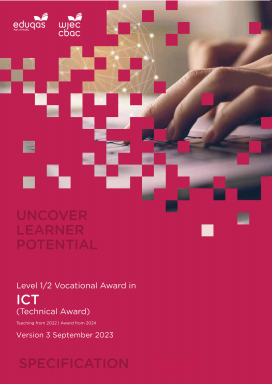GCSE Computer Science
AQA Computer Science (8525)
This challenging GCSE has been designed to teach concepts and develop techniques that have long-term value which support progression to higher education and beyond. The course will provide students with an engaging and stimulating experience of Computer Science and programming. The new specification is a mixture of theory and computational thinking and practice. It provides opportunities for students to explore the wider social and ethical issues associated with Computer Science and to develop as responsible practitioners.
A course in Computer Science offers candidates a unique opportunity to gain an understanding of how computers work and to create and troubleshoot computer programs for real-life purposes relating to their own personal interests. Computer Science develops valuable programming and computational thinking skills, which are increasingly relevant to a wide variety of jobs. Employers want workers with an understanding of rigorous principles that can be applied to changing technologies.
There are eight topics covered as part of this course:
1 - Fundamentals of algorithms
2 - Programming
3 - Fundamentals of data representation
4 - Computer Systems
5 - Fundamentals of computer networks
6 - Cyber security
7 - Relational databases and SQL
8 - Ethical, legal and environmental impacts of technology on wider society
The course is assessed at the end of year 11 through two exams, both worth 50%.
Paper 1:
“Computational thinking and programming” is a 2 hour written exam and will include content drawn from units 1 and 2 listed above.
Paper 2:
“Computing concepts” is a 1 hour 45minute written exam and will include content drawn from units 3-8 listed above.
GCSE Business Studies
Business Studies is a challenging subject which blends a number of specialist fields such as marketing, human resources, accounting and finance and operations management, which together make up a course that is highly relevant to the modern world. Industry related activities, outside visits, visiting speakers, field and market research and the extensive use of information technology feature strongly in the course.
As a GCSE course, the focus is on the theory of business rather than the practical aspects. Being able to apply mathematical concepts to business is a key feature of this GCSE.
Content:
1. Business activity – the basics of business including why people start businesses
2. Influences on business – an in-depth look at business stakeholders and how they influence firms
3. Business operations – managing production, quality, logistics and the sales process
4. Finance – sources of finance for start-ups and operations, cash flow, profit and loss statements
5. Marketing – identifying and meeting customer needs, market research and the marketing mix
6. Human resources – getting the right staff, training, motivation and management of staff
How will you be assessed?
There are two exams at the end of year 11. Both exams will be structured the same way and each last 1 hour and 30 mins.
Each paper is divided into three sections:
Section A: 35 marks,
Section B: 30 marks,
Section C: 25 marks.
The paper will consist of calculations, multiple-choice, short-answer and extended-writing questions.
Questions in Sections B and C will be based on business contexts given in the paper.
The exams will also include synoptic assessment; the understanding of the connections between different elements of the subject. It involves explicit drawing together of knowledge, skills and understanding. This is a challenging element of the course and was previously only assessed at A-level.
WJEC Level 1/2 Tech Award in ICT
The Vocational Award in ICT has been designed to support learners in schools who want to learn about this vocational sector and the potential it can offer them for their careers or further study. It is most suitable as a foundation for further study. This further study would provide learners with the opportunity to develop a range of specialist and general skills that would support their progression to employment.
Unit 1 allows learners to explore the wide range of uses of hardware, application and specialist software in society. Learners will investigate how information technology is used in a range of contexts, including business and organisations, education and home use of information technology. This unit makes up 60% of the qualification via an externally assessed exam.
Unit 2 introduces learners to a broad working knowledge of databases, spreadsheets, automated documents and images and enables learners to apply their knowledge and understanding to solve problems in vocational settings. This NEA unit makes up % of the qualification.


